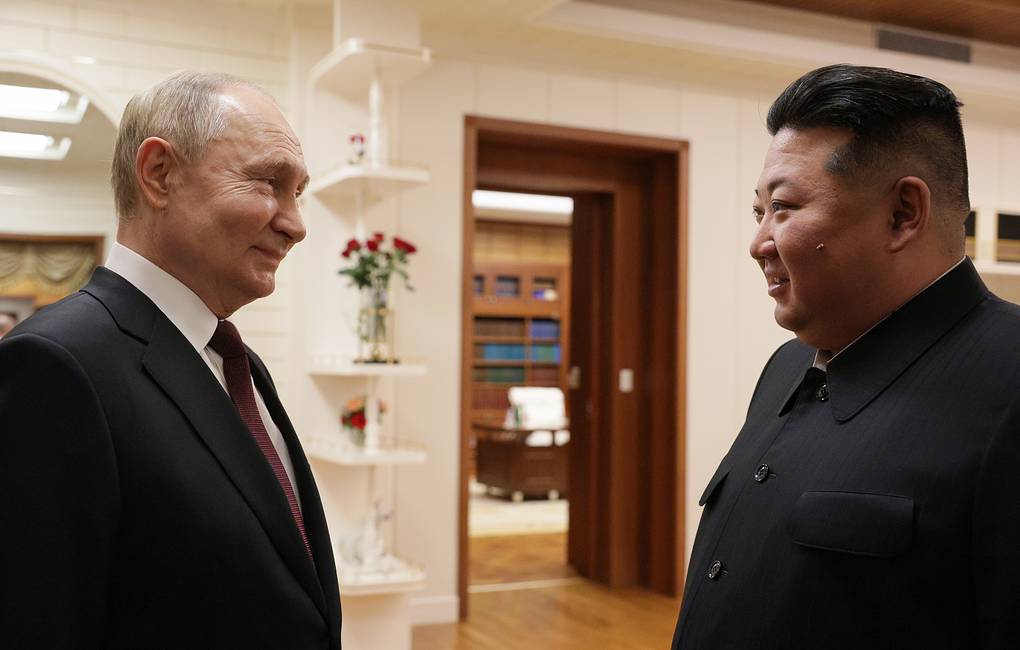PYONGYANG: Russian President Vladimir Putin, who is in Pyongyang on a state visit, will meet today with his Korean counterpart, President of the State Affairs of Democratic People’s Republic of Korea (DPRK) Kim Jong Un.
The leaders of the two countries will spend almost the entire day at the negotiating table in various formats.
Although last year Russia and North Korea marked the 75th anniversary of the establishment of diplomatic relations, the history of mutual visits is not very rich.
Putin visited Pyongyang only once, in July 2000. Back then the Russian leader met discussed issues of the bilateral and international agenda with the leader of the country at that time, Kim Jong Il – the father of the current leader of the republic. Putin visited the tomb of the founder of the DPRK Kim Il Sung and laid flowers at the monument to the Soviet Army – Liberator.
Kim Jong Un, who succeeded his father as the head of the country, opened a “new chapter” in relations between Moscow and Pyongyang. This is how Rodong Sinmun, the main newspaper of the Workers’ Party of Korea, assessed the results of his visit to Russia.
The young leader first came to Russia, to Vladivostok, by train in April 2019. Later, during the coronavirus pandemic, the borders of the DPRK were closed, but after the pandemic, Kim Jong Un made his first foreign visit to Russia’s Far East. In September 2023, he visited three Russian regions at once – the Amur and Khabarovsk regions and the Primorye territory.
It was then, on September 13, 2023, at the Vostochny cosmodrome, during negotiations with the President of Russia, that the leader of the DPRK invited Putin to pay a return visit at a time convenient for him. The Russian President immediately accepted the invitation.
Strengthening ties
Over the next few months, bilateral exchanges at various levels intensified.
In October 2023, Russian Foreign Minister Sergey Lavrov visited the DPRK. Then the director of the Foreign Intelligence Service, Sergey Naryshkin, and a delegation from the group on cooperation between the Federation Council and the Supreme People’s Assembly of the DPRK visited Pyongyang.
In January 2024, North Korean Foreign Minister Choe Son-hui visited Moscow. At the end of March, Minister of External Economic Affairs Yun Jong-ho visited Moscow, and on April 5, the head of the DPRK Ministry of Education, Kim Seung-du, went on a visit.
From economics to politics
The upcoming Russian-Korean negotiations provide the parties with an opportunity to further deepen bilateral cooperation. As presidential aide Yury Ushakov said, Putin’s visit to the DPRK is, of course, important for bilateral relations and their further development, but besides this, the trip “shows that Russia stands for an equal dialogue and is open to cooperation with all countries, especially with our closest neighbors, despite all attempts of collective The West to put pressure on us.”
The Kremlin representative drew special attention to the fact that Korean friends show an understanding of the real causes and essence of the Ukrainian crisis. Moscow appreciates this. “We are grateful to them for their consistency and unwavering support for Russia’s special military operation, we are grateful that Pyongyang recognized the independence of the Donetsk and Lugansk people’s republics and the results of the referendums on the entry of the DPR, LPR, Zaporozhye and Kherson regions into the Russian Federation,” Ushakov said.
According to him, at the upcoming negotiations, significant attention will be paid to discussing the international agenda. It is important that the approaches of the two countries to current foreign policy problems are very close or completely coincide. Ushakov stressed that the countries together defend the formation of a multipolar world on the principles of equality, respect for sovereignty and non-interference in internal affairs. It is likely that this issue will be discussed during informal communication between Putin and Kim Jong Un.
The delegation which is accompanying Putin on this trip includes: Foreign Minister Sergey Lavrov, First Deputy Prime Minister Denis Manturov, Deputy Prime Minister Alexander Novak, Defense Minister Andrey Belousov, Deputy Defense Minister Alexey Krivoruchko, Health Minister Mikhail Murashko, head of the Ministry of Transport Roman Starovoyt, Head of Roscosmos Yury Borisov, head of Russian Railways Oleg Belozerov, the governor of Primorye Oleg Kozhemyako and others.
The Russian-Korean negotiations will result in signing of joint documents. Ushakov did not rule out that one of them could be a new Treaty on Comprehensive Strategic Partnership between the Russian Federation and the DPRK.
“This document is also being worked on,” the Kremlin spokesman said, clarifying that the new document will replace the Treaty of Friendship and Mutual Assistance of 1961, the Treaty of Friendship and Good-Neighborhood Cooperation of 2000, and the Moscow and Pyongyang Declarations of 2000 and 2001.
Answering the question whether the new document will involve cooperation in the field of military-technical cooperation and military assistance, Ushakov noted that “it will outline the prospects for further cooperation and will be signed, naturally, taking into account what has happened between the countries in recent years in the field of international politics, both in the economic sphere and in the sphere of relations along all lines, including taking into account security issues.” But Vladimir Putin and Kim Jong Un will talk about the final results of the negotiations themselves while making their statements for media.


